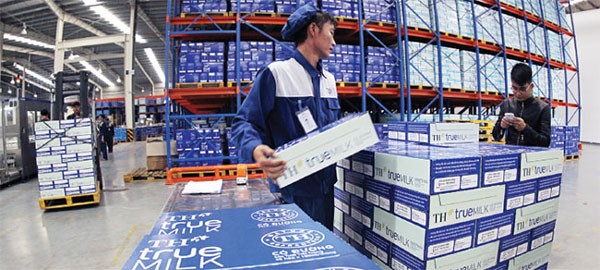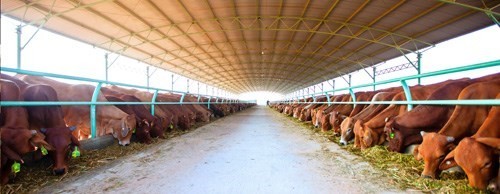(VOVworld) – Vietnam’s agriculture is receiving an increase of domestic and foreign investment. To use the investment flow effectively, the Vietnamese government has promulgated mechanisms and policies to remove obstacles for businesses.
 |
| TH true MILK is strongly promoted through its modern branding (Photo: vietnamnet.vn) |
An increasing number of businesses, including major groups, have been investing in the agriculture sector.
The TH Group, Vietnam's third-largest dairy company, has invested in agriculture since 2009 with a project in Nghe An province to raise dairy cows and process milk on a large scale using high-technology.
The TH Group, which is famous for its TH True Milk brand, has 45,000 cows and produces as much as 900,000 liters of milk a day.
Encouraged by the success of the TH Group, other private giants have expanded their investment in the agriculture sector - property conglomerate Hoang Anh Gia Lai, steel group Hoa Phat, and Vietnam’s largest property developer Vingroup.
 |
| Investment of Vietnam’s tycoons is just the beginning of an investment trend in agriculture in the coming time. A cow farm of Hoang Anh Gia Lai group (Photo: Hoang Anh Gia Lai). |
According to Tran Manh Bao, Chairman and Director General of the Thai Binh Plant Varieties Company, “it often takes a long time for enterprises to acquire and put the promulgated mechanisms and policies into practice. Our most urgent task right now is to improve coordination among state management agencies, businesses, and consulting firms so that companies can make effective use of the available policies.”
Vietnam’s tax policy is a major concern for businesses interested in making a long-term investment in agriculture. Nguyen Dinh Son, Chairman and Director General of Da Lat Flower - Forest Biotechnology Corporation, says preferential tax incentives will help to increase businesses’ competitiveness in the export market.
Nguyen Lam Vien, Chairman of the Vinamit Company, which specializes in production and sales of dried fruits, says: “the domestic market brings in 60% of Vinamit’s revenue and the remainder comes from exports. With an annual turnover worth millions of USD, we have to pay a 10% value added tax because we don’t get a deduction for the amount of input materials we buy from farmers. Businesses hope that the Ministry of Agriculture and Rural Development will work with relevant agencies to help investors and the agriculture sector develop sustainably.”
Doctor Dang Kim Son, Director of the Institute of Policy and Strategy in Agriculture and Rural Development, says: “it’s obvious that agriculture has become an effective investment destination. We should cover ways to access and open the domestic and export market in new policies. A specialized unit should be set up to link businesses and relevant agencies to resolve hurdles and put policies into practice.”
The Ministry of Agriculture and Rural Development has implemented a plan to restructure the agriculture sector toward improving added value and sustainability with the goal of turning the industry into an economic spearhead.
Making the plan a success will require breakthroughs in policies to attract greater investment in the field.